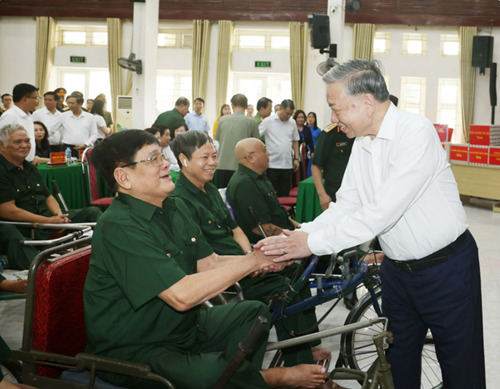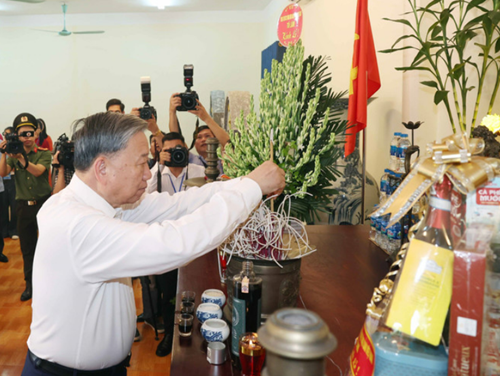Below is the full translation of the article.
WHEN DRINKING WATER, REMEMBER ITS SOURCE
To Lam, General Secretary of the Communist Party of Vietnam Central Committee
Each year in July, our people dedicate their most sacred and profound feelings to remembering and expressing gratitude to those who sacrificed for the country, heroic martyrs, wounded and sick soldiers - who did not spare their blood, bones and lives for the independence, freedom and peace of the Fatherland. July 27 is also an occasion for the whole Party, people and military to express their deep gratitude to the families of those who have rendered service to the revolution. The noble tradition of "when drinking water, remember its source" has become a sacred thread connecting generations of Vietnamese people, a source of great spiritual strength for the entire nation to unite, overcome all hardships, build an increasingly rich and civilized country, worthy of the great sacrifices and contributions of generations of forefathers.
    |
 |
|
Party General Secretary To Lam visits wounded soldiers at Thuan Thanh Nursing Center for Wounded Soldiers in Ninh Xa ward, Bac Ninh province, on July 15, 2025. |
Vietnam’s over 4,000-year history is an everlasting epic of patriotism, resilient will, and indomitable struggle, a living tribute from those who enjoy peace today to those who laid down their lives for the nation. Having gone through arduous and sacrificial wars to defend the country, from the Hung Kings' era to the difficult resistance wars against foreign invaders, our nation has never bowed to tyranny nor retreated in the face of invasion. Particularly, over the past 95 years under the leadership of the Communist Party of Vietnam, and 80 years of the Socialist Republic of Vietnam, millions of the nation’s finest sons and daughters have laid down their lives so the Fatherland could rise up, and our country could be independent, peaceful, and unified, allowing the people to live in freedom, prosperity, and happiness, and to aspire toward a future of prosperity and power.
We could not have today, could not have a renewed, developed, deeply integrated Vietnam without the sweat, blood and bones of countless generations of revolutionary soldiers, soldiers, youth volunteers, frontline workers, mothers and fathers who were ready to encourage their children to go to battles and take the difficult, arduous, and lost part for themselves with the spirit of "Determined to brave death for the survival of the Fatherland", "All for the frontline". Together with our ancestors, more than 1.2 million martyrs, 9.2 million people with contributions to the revolution and their relatives nationwide today, all are the immortal souls of the nation, the most beautiful symbol of Vietnamese revolutionary heroism. Across the country, more than 3,000 martyrs' cemeteries and over 4,000 memorials honoring fallen heroes stand as torches that always light up the achievements and commemorate the heroic martyrs; more than 100 million Vietnamese hearts are a source of abundant emotions, imbued with the moral values of "when drinking water, remember its source", "remembering the one who planted the tree when eating fruit". These values are a tribute to those who devoted themselves to the nation.
    |
 |
|
Party General Secretary To Lam offers incense in commemoration of war heroes and martyrs at the Thuan Thanh Nursing Center for Wounded Soldiers in Ninh Xa ward, Bac Ninh province, on July 15, ahead of the 78th Wounded Soldiers and Martyrs' Day (July 27, 1947 - 2025). |
President Ho Chi Minh once taught: “For those who have courageously sacrificed a part of their own flesh and blood... the Party, the Government and the compatriots must seek all means to ensure that they have secure food and shelter. At the same time, it is necessary to open vocational training classes suitable to each individual, so that they may gradually be able to become self-reliant. For the martyrs in each locality, it is necessary to build gardens of remembrance and memorial steles inscribed with their heroic sacrifices, in order to eternally educate our people about the spirit of patriotism. As for the parents, wives and children of wounded soldiers and martyrs, who lack the capacity to work and live in hardship, local authorities must support them in securing suitable employment and resolutely ensure that they do not suffer hunger or cold.”
In line with Uncle Ho’s teachings, numerous preferential policies have been promulgated, countless gratitude houses and July 27 gifts have been presented to invalids, the families of martyrs, and those who rendered meritorious service to the nation across all regions of the country. Directive No. 14/CT-TW, issued by the Party Central Central Committee’s Secretariat on July 17, 2017, on continuing to strengthen the Party’s leadership over affairs concerning revolution contributors; Resolution No. 42-NQ/TW, issued by the Party Central Committee on November 24, 2023, on continuing to reform and enhance social policies to meet the national construction and defense requirements in the new period; and the Ordinance on preferential treatment for people who contribute to the revolution... – these demonstrate the obligations, sense of responsibility, moral duties, and also the sentiments and profound gratitude of the people, of the Party and the State towards those who have shown “utmost loyalty to the nation, utmost filial piety to the people,” and have wholeheartedly served the country and its people.
To continue upholding the national tradition, following Uncle Ho’s teachings, and realizing the Party and the State's guidelines regarding wounded soldiers, the families of martyrs, policy beneficiary families, and revolution contributors, we must maintain focus on implementing the following key tasks:
First: It is important strengthen the leadership and direction of all-level Party committees, authorities, Vietnam Fatherland Front committees, and all mass organizations in caring for and protecting the rights and legitimate interests of revolution contributors. Efforts must be made to ensure the full and timely implementation of all preferential policies for wounded soldiers, martyrs, sick soldiers, people with meritorious service and their relatives, and policy beneficiary families, without any mistakes, delays or tokenistic actions.
Second: Policies and laws regarding revolution contributors should be reviewed and perfected in a fair and transparent manner for right beneficiaries, while also expanding the scope of policies to include those who have truly contributed but whose services have yet to be appropriately recognized. Priority must be given to reforming administrative procedures for the verification and provision of entitlements for those who have contributed to the cause of national liberation, reunification, and the building and development of socialism.
Third: efforts must focus on mobilizing resources to improve the material and spiritual well-being of policy beneficiary families and revolution contributors, particularly those in disadvantaged areas, remote and rural regions, border zones, islands, ethnic minority communities, former revolutionary bases, and former resistance areas. The “repaying debts of gratitude” movement should be further promoted through the construction and repair of charity houses, medical support, functional rehabilitation, vocational training, and the creation of sustainable jobs for children of those who rendered service to the nation.
Fourth: the supervisory, monitoring, and constructive roles of the Vietnam Fatherland Front, socio-political organizations, and the public must be strongly promoted in implementing policies for wounded soldiers, martyrs, and revolution contributors. At the same time, fraudulent activities involving false declarations to exploit social welfare benefits must be promptly detected and strictly dealt with.
Fifth: communication and education on the tradition of patriotism and gratitude to revolution contributors should be intensified across society, especially among younger generations. These efforts should be effectively integrated into political and ideological education, as well as extracurricular activities of schools, agencies, and institutions. Public awareness and civic responsibility in upholding the moral principle of “remembering the source of the water we drink” and “expressing gratitude to those who rendered service to the nation” should be enhanced.
Sixth: digital technology should be applied to build a digitized database on revolution contributors for accurate, consistent, and transparent management, monitoring, and policy evaluation. Connectivity and data sharing between central and local agencies should be strengthened to better serve the people. Scientific and technological advances should also be applied to support the search, repatriation, and identification of martyrs’ remains with incomplete information.
Seventh: activities of remembrance, gratitude, and visits to honor revolution contributors should be organized in a practical and thoughtful manner, avoiding formality and wastefulness. Campaigns such as “Gratitude repaying” and “All people care for revolution contributors” should be promoted in tandem with the development of new-style rural areas, civilized urban spaces, all-people national defense and public security, and sustainable social welfare.
These outlined tasks must be translated into action plans by every locality, village, residential group, sector, and agency, and carried out with the highest sense of responsibility as a profound expression of gratitude by the Party, State, and people for the great sacrifices made by wounded soldiers, martyrs, and all those who contributed to the revolution.
Source: VNA